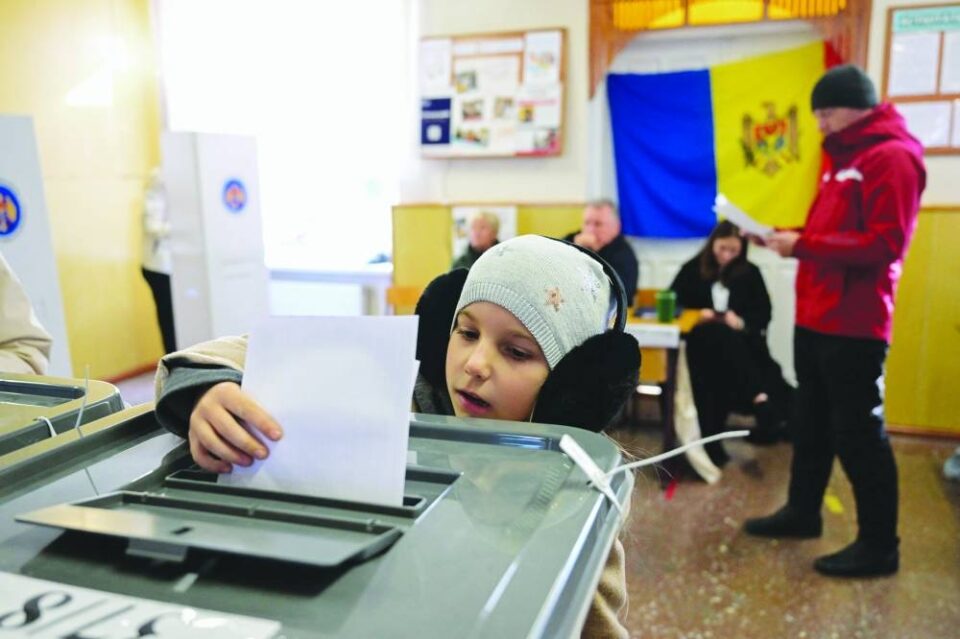Moldovans voted yesterday in a presidential election and a referendum on joining the European Union, some troubled by fears of Russian meddling amid the war in neighbouring Ukraine.The elections are a test of the former Soviet republic’s pro-European turn under incumbent President Maia Sandu, who is seeking a second term.Police made hundreds of arrests after discovering a massive vote-buying scheme.This week, they warned that up to a quarter of the ballots cast in the country of 2.6mn could be tainted by Russian cash.Sandu, who beat a Moscow-backed incumbent in 2020, cut ties with Moscow and applied for Moldova to join the EU following Russia’s invasion of Ukraine in 2022.She has repeatedly sounded the alarm about Russian efforts to interfere in the vote.Washington issued a fresh warning this week about suspected Russian interference, while the EU passed new sanctions on several Moldovans.“I have come to cast my vote for prosperity, peace and well-being in our country,” said Olga Cernega, a 60-year-old economist in the capital Chisinau.Another voter, Ghenadie, who declined to give his last name, said he was worried by what he saw as the country’s “Western” drift and thought the government was “making the situation worse” economically.An hour from there in the town of Varnita, a polling booth was set up specifically for inhabitants of the breakaway pro-Russian region of Transnistria.Nicolai, 33, an IT specialist, who declined to give his full name for fear of repercussions in Transnistria, said he had voted “yes” in the referendum and for Sandu as president.“I want a life in a free and safe European country,” he said.Outside a polling station, Tamara, 78, said she voted “no” and against Sandu because she was “completely fed up” and wanted the country to improve living standards, not join the EU.Vyacheslav, 60, and his wife Tamara, 63, said: “We voted for our children, for Europe and for our future.”Sandu, 52, a former World Bank economist and Moldova’s first woman president, is the clear favourite in the race.However, with only 35.8% of voter support, according to the latest survey ahead of the election, she is predicted to fall short of the majority needed to avoid a second-round ballot on November 3.“This election will determine our fate for many years,” Sandu said when she came out to vote.The “will of the Moldovan people” should be heard, “not that of others, not dirty money”, she added.Her 10 competitors include Alexandr Stoianoglo, a 57-year-old former prosecutor backed by the pro-Russian Socialists, who was polling at 9%.Renato Usatii, a 45-year-old former mayor of Moldova’s second largest city Balti, was predicted to win 6.4%.Voter turnout about two hours before polls closed stood at almost 49% for the presidential election: seven percentage points higher than in 2020; and more than 42% for the referendum asking whether to modify the constitution to include joining the EU as an objective.A turnout of more than 33% was needed for the referendum result to be valid.Of those surveyed before the polls, 55.1% said they would vote “yes”, while 34.5% said they were set on “no”.The 27-member bloc began membership talks with Chisinau this June.Sandu’s critics say she has not done enough to fight inflation in one of Europe’s poorest countries or to reform the judiciary.In his campaign, Stoianoglo – who was fired as prosecutor by Sandu – has called for the “restoration of justice” and vowed to wage a “balanced foreign policy”.He abstained from voting in the referendum.Usatii has argued that he is “the only one who is not controlled either by the East or the West”.Fears of Russian interference are looming large.Police said this month that millions of dollars from Russia to corrupt voters were funnelled into the country by people affiliated to Ilan Shor, a fugitive businessman and former politician.The “unprecedented” scheme could taint up to 300,000 ballots, according to police.Convicted in absentia last year for fraud, Shor regularly brands Moldova a “police state” and the West’s “obedient puppet”.In addition to the suspected vote buying, hundreds of young people were found to have been trained in Russia and the Balkans to create “mass disorder” in Moldova, such as using tactics to provoke law enforcement, according to police.Russia denies interfering and accuses Sandu’s government of “Russophobia”.
